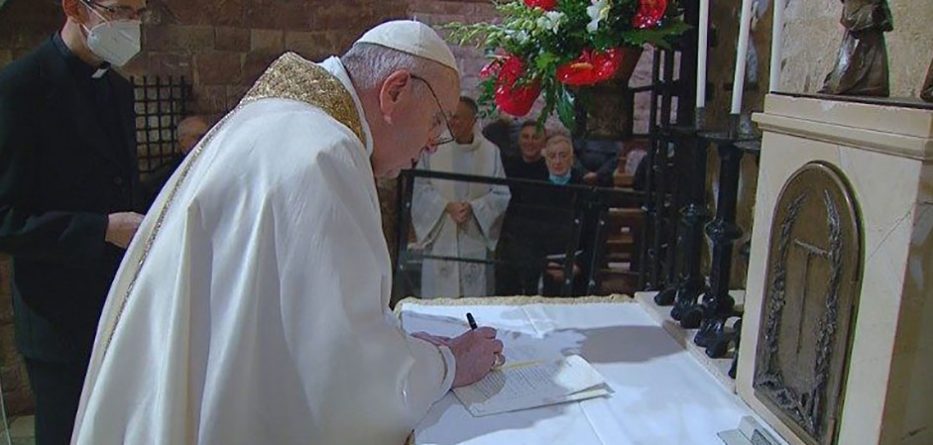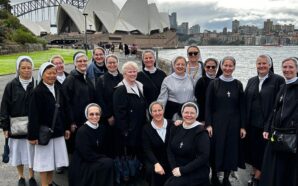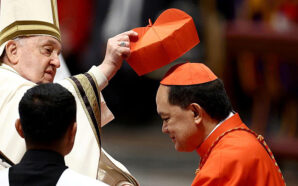It’s been one year since the release of Pope Francis’ encyclical, Fratelli Tutti. This encyclical was an important contribution to the documents that make up Catholic Social Teaching, a series of teaching documents that began with Pope Leo XIII’s Rerum Novarum (1891).
The significance of Fratelli Tutti is heightened by the fact that it was published in the middle of the coronavirus pandemic. Because of this, it contains many relevant points of reflection that would be good to revisit.
Where we are today
Pope Francis began the encyclical with a refreshingly honest analysis of where we are today, not just as a Church but as a world in the midst of a pandemic. The leading subtitle for chapter one is, tellingly, ‘Shattered Dreams’. It is an appraisal of what has resulted from twentieth century, post-war idealism and optimism. The hopes for greater progress, for a more united and global humanity, are a mess.
Despite the desire for a more open world, Pope Francis said, “We are more alone than ever” (§12). From closed-in populist politics to liberal economics that is exploitative of the poorest of our world; to ideologies that keep young people uprooted and distrustful; to terrorism and the lack of respect for human rights; to the plight of people suffering at the borders; to the “throwaway culture” that characterises our own; and finally to the “illusion of communication” and the way in which digital technology divides, promotes hatred, sows contempt and conflict and erases the opportunity for authentic encounters with real, human people (§9-55).
It is not a document without hope, however. He concludes the first chapter with a phrase taken from Pope Benedict XVI’s encyclical Spe Salvi: “No one is saved alone” (SS §48; FT §54). In doing so, Pope Francis calls us, in some ways, to get back to basics; to re-learn one of the most basic elements of Church and life: social friendship and fraternity (or, ‘brotherhood’).
The Good Samaritan
Fratelli Tutti hinges upon chapter two, which is a reflection on the Gospel passage concerning Jesus’ parable of the Good Samaritan (Luke 10:25-37). Pope Francis, as a Jesuit, leads us in a typically Ignatian reflection, inviting us to imaginatively inhabit the text, to see ourselves within it and draw out its many implications, perhaps unseen at first. After taking us through the characters in the story, Pope Francis asks us: “Which of these persons do you identify with?” (§64).
What Francis does with this story is interesting. We tend to think of our ‘neighbours’ as people who are fundamentally recipients of love, as if ‘neighbours’ are the ones we are supposed to love. One of the implications of the story that Pope Francis draws out, however, is that to be a neighbour is actually something active; it is a ‘vocation’ (§66). It is to be someone who encounters another person in their suffering and shows them mercy. What Jesus does in the parable is turn the question around; instead of answering the question, ‘And who is my neighbour?’, Jesus shows them, through a story, what a neighbour is, treating it as something we are called to be. This interpretation is pivotal, because only when we rediscover this calling can we properly build social friendship.
What Pope Francis’ reflection here also demonstrates is that his idea of ‘fraternity’ is not abstract and meaningless; his understanding of fraternity is rooted in the idea of human suffering. Fraternity can only truly come about when we allow ourselves to encounter the suffering of others:
“The parable clearly does not indulge in abstract moralizing, nor is its message merely social and ethical. It speaks to us of an essential and often forgotten aspect of our common humanity: we were created for a fulfilment that can only be found in love. We cannot be indifferent to suffering; we cannot allow anyone to go through life as an outcast. Instead, we should feel indignant, challenged to emerge from our comfortable isolation and to be changed by our contact with human suffering. That is the meaning of dignity.” (§68).
A better politics
This is something that resonates with everyone today. Politics has become all-consuming, and we are drenched in endless political commentary. Pope Francis also recognises that many people are disenchanted with the idea of politics, seeing it as simply the place of corruption or ideological thinking or narrow, self-serving interests (§176).
What he tries to do in Fratelli Tutti is re-establish the idea of ‘political love’ as central to our understanding. The idea of political love, or ‘political charity’, is firmly rooted in Catholic Social Teaching: The Compendium tells us that to love someone socially or politically is to ‘make use of social mediations’ in order to help people in their destitution (§208). Because love is the goal and vocation of human life, no aspect of human life can be defined without it; thus, the words politics and love need to be reunited if we are to have a healthy participation in the political arena.
A better kind of politics, the Pope says, is also one that is concerned for the truth. Moral relativism will not help us as we try to work for a more fraternal world:
“A society is noble and decent not least for its support of the pursuit of truth and its adherence to the most basic of truths. We need to learn how to unmask the various ways that the truth is manipulated, distorted and concealed in public and private discourse’” (§207-8).
This is something that goes to the heart of the Catholic understanding that love and truth go together; they should never be separated.
The role of religion
There is no basis for fraternity, Pope Francis writes, without ‘an openness to the Father of all’ (§272). In fact, without the recognition that humanity is made in the image and likeness of God, that humanity’s dignity is a ‘transcendent dignity’, totalitarianism takes hold of us (§273). Quoting Pope John Paul II, he writes that without the acknowledgment of transcendent truth, the only way forward is by means of power and force.
Even though the political arena has a certain and qualified autonomy from the religious arena, the mission of the Church is not a private mission; it is a mission with political implications and consequences. The Church has a vitally public role to play (§276).
“It should be acknowledged that ‘among the most important causes of the crises of the modern world are a desensitized human conscience, a distancing from religious values and the prevailing individualism accompanied by materialistic philosophies that deify the human person and introduce worldly and material values in place of supreme and transcendental principles’. It is wrong when the only voices to be heard in public debate are those of the powerful and “experts”. Room needs to be made for reflections born of religious traditions that are the repository of centuries of experience and wisdom. For ‘religious classics can prove meaningful in every age; they have an enduring power [to open new horizons, to stimulate thought, to expand the mind and the heart]’. Yet often they are viewed with disdain as a result of ‘the myopia of a certain rationalism’” (§275).
A point that Pope Francis brings up again and again is similar to this: our thinking is too small. If we think only in terms of material values and immediate interests, we will never cultivate a society worth living in. Those things never cultivate genuine friendships even on the private level; friendship is deeper than that, more relational, more long-term and aspiring after values that are not just material. Openness to the wisdom contained with the Christian religious tradition – and other traditions – is essential for the development of genuine social friendship and fraternity.
Christian Bergmann is a copywriter for Melbourne Catholic. His areas of interest include history, theology, literature and film. He lives in Perth with his wife and daughter.
Reproduced with permission from Melbourne Catholic, the news publication of the Catholic Archdiocese of Melbourne.








